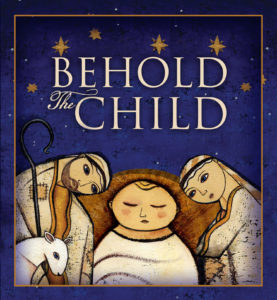Behold the Child!
Advent is soon upon us. What a glorious time of year as we prepare for the coming (advent) of God in the flesh made manifest! A devotional booklet has been placed in your member mailbox, for you (& your family) to use. Our pastoral prayer is that such devotions and study further unite us as a faith family here at Advent Evangelical Lutheran Church. Please also plan your upcoming weeks accordingly, as we will now have a family meal and a special worship service during these Wednesdays in Advent. In the midst of the holiday bustle, let us take but a brief pause each week to be filled with the light and strength of God’s mercy and grace. May the Lord bless and keep you and your family as we prepare for the coming of the Messiah…behold the Child!
Pr. Mackay
 Behold the Child!
Behold the Child!
God the Father is reconciled.
We long for reconciliation—a marriage healed, the return of a prodigal child, the open arms of a formerly harsh parent. Advent is just the season for reconciliation. It is a penitential season, calling us to examine ourselves, acknowledge our sin with contrition, and trust that our sin is forgiven for the sake of Christ. Such self-examination reveals that the fault for our broken relationships is not one-sided. The sin visited upon me by another has driven a wedge between us, but so has my sin. Part of the distance between me and others is due to my sinful actions—my sinful refusal to forgive, my sinful pride that will not admit my fault, my sinful contentment with a cold shoulder.
Advent calls us to repent of our divisions. Advent calls us to rejoice in reconciliation. Though you can forgive another even when he refuses to acknowledge his fault, reconciliation is found when both parties are willing to admit their culpability, seek forgiveness, and amend their ways. That can seem so difficult. It is hard enough for one sinner to confess his sin and trust that the Lord purges it from his life. How much more challenging it is for two sinners to do so. Yet that is exactly what Christ works among and within us. He grants us confidence in His forgiveness so that we forgive one another, receive one another’s forgiveness, and are thus reconciled.
Reconciliation with some remains ever elusive. We hunger for it; we pray for it. Yet the distance remains. When a parent apologizes to a child so that they embrace for the first time in decades, we rightly rejoice. When our longing is not realized, sorrow results.
The only consolation amid such sorrow is the certainty of your reconciliation to the Father. It is certain because it is not dependent upon sinners humbling themselves in repentance. It is certain because it is dependent upon the sinless Son of God humbling Himself to take on human flesh and be born of a virgin.
That is the glorious, biblical proclamation found in “The Quempas Carol.” We are blessed to hear therein the refrain, “God’s own Son is born a child . . . ; God the Father is reconciled.” This is not wishful thinking driven by our longings. It is reality driven by Christ.





